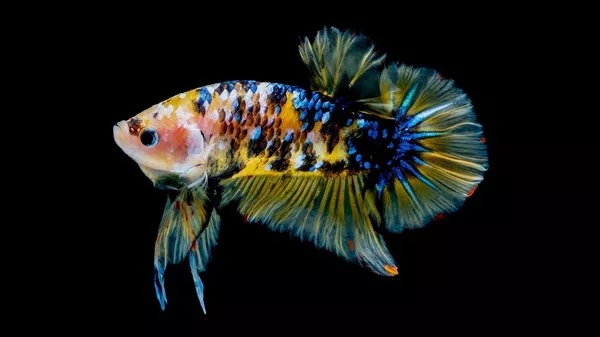Pet enthusiasts and aquarium hobbyists often find themselves captivated by the mesmerizing beauty of betta fish. These vibrant and colorful creatures are known for their striking fins and territorial nature. As responsible pet owners, it is crucial to understand every aspect of our pets‘ lives, including their resting habits. In this article, we will explore the fascinating world of betta fish and answer the question: do betta fish rest?
The Nature of Betta Fish:
Betta fish, scientifically known as Betta splendens, originate from the rice paddies, shallow ponds, and slow-moving waters of Southeast Asia. In their natural habitat, bettas have adapted to a lifestyle that involves frequent resting intervals. Understanding their natural behavior is vital for creating a suitable environment in captivity.
The Importance of Rest for Betta Fish:
Rest is an integral part of any living creature’s life, and betta fish are no exception. Contrary to popular belief, bettas do not sleep in the same way humans do. Instead, they experience periods of rest where they remain still, hover in place, or lie at the bottom of the tank.
See Also:Betta Fish Health
For bettas, resting is crucial for several reasons
Conserving Energy:
Betta fish are active swimmers, and they expend a considerable amount of energy exploring their surroundings. Resting allows them to conserve energy for essential activities such as hunting for food and defending their territory.
Stress Reduction:
Betta fish are known for their territorial behavior, especially among males. Resting provides a break from constant vigilance, reducing stress levels and promoting overall well-being.
Digestive Processes:
During rest periods, bettas can focus on digestion without the distraction of constant movement. This aids in the efficient breakdown of food and nutrient absorption.
Maintaining Health:
Adequate rest contributes to the overall health of betta fish. A well-rested betta is more resilient to diseases and less prone to behavioral issues associated with stress and exhaustion.
Recognizing Betta Fish Resting Behavior
To determine if your betta is resting, it is essential to observe their behavior closely. Betta fish exhibit specific signs during their rest periods, and recognizing these behaviors can help you ensure the well-being of your pet.
Stationary Hovering:
Betta fish often exhibit stationary hovering, where they remain in one spot, slightly moving their fins to maintain balance. This behavior is normal and indicates a restful state.
Lying at the Bottom:
Another common resting behavior is when bettas lie at the bottom of the tank. This is not a cause for concern, as long as the betta is responsive when approached.
Top Floating:
Betta fish have a unique organ called the labyrinth organ, allowing them to breathe air from the water’s surface. During rest, bettas may float near the top of the tank, breathing through this organ.
Reduced Activity:
A betta in a state of rest will display reduced activity. They may not swim around as much and might prefer staying in one area of the tank.
Creating an Ideal Resting Environment
As responsible betta fish owners, it is our duty to provide an environment that promotes natural behaviors, including resting. Here are some tips to create an ideal resting environment for your betta:
Appropriate Tank Size:
Ensure that your betta is housed in an adequately sized tank. A larger tank allows for more swimming space and provides areas for your betta to rest without feeling confined.
Proper Water Conditions:
Maintain optimal water conditions, including temperature and pH levels. Clean, well-filtered water reduces stress and contributes to a healthier, more restful environment.
Adequate Hiding Places:
Provide hiding spots and decorations in the tank where your betta can retreat for rest. Plants, caves, and other ornaments offer secure spaces and mimic their natural habitat.
Regular Feeding Schedule:
Establish a consistent feeding schedule to ensure your betta receives proper nutrition. A well-fed betta is more likely to engage in regular resting periods.
Avoid Overcrowding:
Betta fish are territorial, and overcrowding can lead to stress. Keep a limited number of compatible tankmates to create a harmonious environment.
Common Misconceptions
Despite their popularity as pets, betta fish are surrounded by various misconceptions. It is essential to dispel these myths to better understand and care for these captivating creatures.
Bettas Don’t Need Rest:
Some owners believe that bettas do not need rest and should be active at all times. This misconception can lead to stress and health issues for the fish.
Resting Equals Sickness:
Another common myth is that a betta fish resting at the bottom of the tank is sick. While excessive lethargy may indicate health concerns, occasional resting is a normal behavior.
Bettas Sleep Like Humans:
Unlike humans, bettas do not experience deep sleep cycles. Their restful periods involve reduced activity while remaining alert to their surroundings.
Conclusion:
In conclusion, understanding betta fish resting behavior is crucial for providing optimal care and ensuring the well-being of these fascinating aquatic pets. By recognizing the importance of rest, observing resting behaviors, and creating an ideal environment, pet owners can contribute to the overall health and happiness of their betta fish.
Remember, a well-rested betta is a healthy betta, and by incorporating these insights into your care routine, you can foster a thriving and vibrant aquatic environment for your beloved pet.
Related Topics:
Do betta fish need darkness to sleep?
How often to clean betta fish tank?
How many times should i feed my betta fish?
























